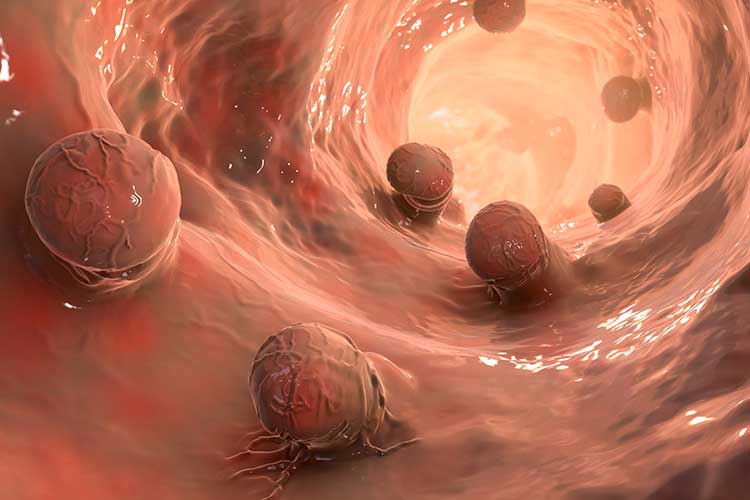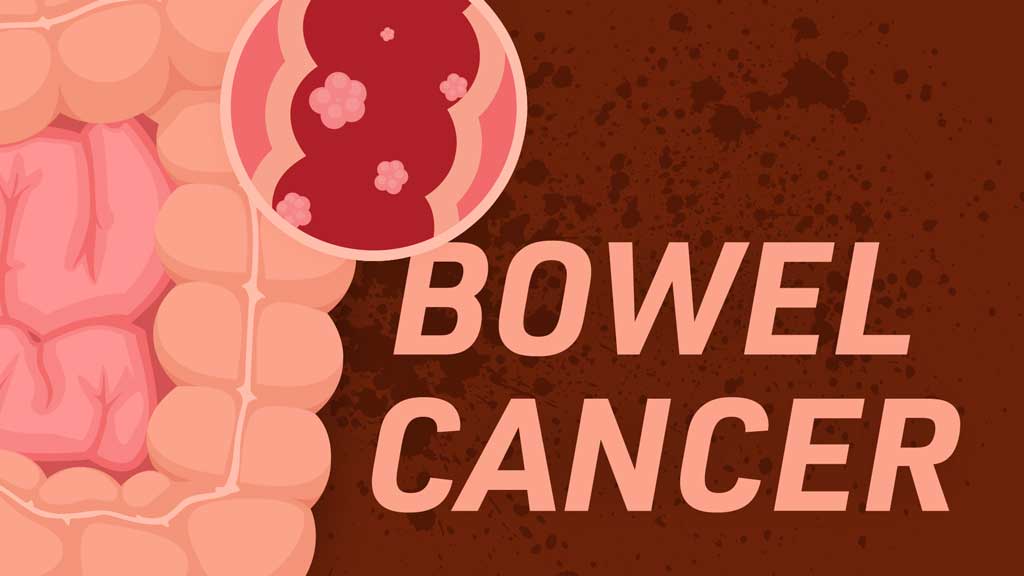Bowel cancer, also known as colorectal cancer, is an umbrella term used to describe cancers of the large bowel/intestine (colon and rectum) (Cancer Council Victoria 2021).
Depending on which part of the large bowel is affected, the cancer may be referred to more specifically as colon cancer or rectal cancer, although the two are often grouped together due to their similarities (ACS 2020).
It’s the fourth most common type of cancer in Australia (excluding non-melanoma skin cancers) after prostate cancer, breast cancer and melanoma of the skin, with about 15,400 diagnoses made annually (AIHW 2023).
The Colon and Rectum
The colon and rectum, which together form the large bowel, are part of the gastrointestinal system (ACS 2020).
The colon is a 1.5-metre-long muscular tube that absorbs water and nutrients from partially digested food, leaving behind waste (faeces) that is then passed into the rectum. Faeces is stored in the rectum until it is excreted through the anus during a bowel movement (ACS 2020; Better Health Channel 2021).
Causes of Bowel Cancer
Most bowel cancers develop from polyps - clumps of cells that form on the intestinal mucosa (Cancer Council Victoria 2021; Mayo Clinic 2023).
Polyps are common, developing in about 25% of people aged over 50 (NHS 2023). While polyps are initially benign, and most remain harmless, some - particularly adenomatous polyps (adenomas) - may become cancerous if left alone (Cancer Council Victoria 2021; ACS 2020).
Polyps may resemble flat spots on the intestinal lining or raised growths that appear to be suspended by a ‘stalk’ (Better Health Channel 2021; Bowel Cancer Australia 2018).
While 90% of bowel cancers are caused by adenocarcinomas (adenomas that become cancerous) (Better Health Channel 2021; Cleveland Clinic 2021), there are other rare types of bowel cancer, including:
- Squamous cell cancers
- Neuroendocrine tumours (NETs)
- Small bowel cancer
- Gastrointestinal stromal tumours
- Lymphoma.
(Better Health Channel 2021)

Risk Factors for Bowel Cancer
Risk factors include:
- Older age (over 50)
- Inflammatory bowel disease (Crohn's disease or ulcerative colitis), especially if the patient has had it for over eight years
- Previous adenomas or polyps in the bowel
- Previous bowel, ovarian or endometrial cancer
- Family history of bowel cancer or polyps
- Being overweight or obese
- High consumption of red meat, especially processed red meats (e.g. salami, ham, bacon, sausages)
- Smoking
- High alcohol intake
- Rare genetic disorders such as Lynch syndrome.
(Better Health Channel 2021; Cancer Council Victoria 2021)
Symptoms of Bowel Cancer
Bowel cancer may cause no symptoms in its early stages. When symptomatic, it may cause:
- Blood present in faeces, on toilet paper or in the toilet bowl
- Bowel habit changes such as diarrhoea, constipation or more frequent, smaller bowel movements
- Changes in the appearance of faeces (e.g. narrower, presence of mucous)
- Abdominal fullness, bloating, or a strange sensation in the rectum during bowel movements
- Feeling like the bowel hasn’t been completely emptied after a bowel movement
- Unplanned and unexplained weight loss
- Weakness or fatigue
- Rectal or anal pain
- A lump in the anus or rectum
- Abdominal pain or swelling
- Anaemia or iron deficiency
- Blockage in the bowel.
(Cancer Council Victoria 2021)

It’s important to note that changes in bowel movements are normal, and these symptoms don’t necessarily indicate cancer. Differential diagnoses include haemorrhoids, diverticulitis, inflammatory bowel disease and anal fissure. However, any amount of bleeding is a red flag and should be escalated (Cancer Council Victoria 2021).
The National Bowel Cancer Screening Program
About half of all bowel cancer cases in Australia aren’t detected early enough for treatment to be successful. This is a major reason why bowel cancer is the second biggest cause of cancer deaths in Australia (Healthdirect 2020).
The National Bowel Cancer Screening Program uses an immunochemical faecal occult blood test (iFOBT) to detect traces of blood in stools, which is a potential sign of bowel cancer even before the onset of symptoms (DoHaAC 2023).
The screening test is free and can be performed at home. It’s mailed to all eligible Australian people between the ages of 50 and 74 every two years, with the aim of identifying possible bowel cancer cases early (DoHaAC 2023).
Bowel Cancer Diagnosis
If a patient returns a positive bowel screening test or is experiencing symptoms of bowel cancer, the following diagnostic tests may be performed:
- Physical and rectal examination
- Blood tests (e.g. testing for anaemia)
- Colonoscopy
- Biopsy
- Imaging tests (PET-CT scan, CT scan, MRI scan, CT colonography, x-ray)
- Molecular testing on the biopsy sample
- CT colonography
- Flexible sigmoidoscopy.
(Better Health Channel 2021; Cancer Council Victoria 2021)
Bowel Cancer Staging
Bowel cancer typically doesn’t spread quickly. Polyps may take several years to become cancerous (Healthdirect 2020).
In Australia, the most commonly used staging system is TNM (tumour-nodes-metastasis). The Australian Clinico-Pathological Staging (ACPS) system may also be used (Cancer Council NSW 2023).
| TNM | Description |
|---|---|
| Stage I | Cancerous cells are only present in the inner layers of the bowel wall. |
| Stage II | Cancerous cells have spread deeper into the layers of the bowel wall. |
| Stage III | Cancerous cells are present in any layer of the bowel wall and have spread to nearby lymph nodes. |
| Stage IV | Cancerous cells have spread to other parts of the body (e.g. lungs, liver or distant lymph nodes). |
(Adapted from Cancer Council NSW 2023)
Bowel Cancer Treatment
Treatment depends on how far cancer has already progressed, as well as the patient’s health status and preferences (Healthdirect 2020).
Colon cancer and rectal cancer are also treated differently (Cancer Council Victoria 2021).
Early Colon Cancer
Colon cancer is best treated surgically if at an early or locally advanced stage. The patient will typically undergo a colectomy, wherein the cancerous area, as well as a normal area of the bowel and nearby lymph nodes, are surgically removed (Cancer Council Victoria 2021).
During the procedure, the bowel will be cut on either side of the cancerous portion along with a border of healthy tissue. The two remaining ends will then be joined together (a procedure known as anastomosis) (Cancer Council Victoria 2021).
There are different types of colectomies that can be performed depending on what part of the colon needs to be removed. In some cases, the entire colon and rectum will be excised (Cancer Council Victoria 2021).
Some patients may also need to undergo a colostomy or ileostomy (Cancer Council Victoria 2021). The stoma may be temporary or permanent (Better Health Channel 2021).
If the cancer has already spread to the lymph nodes, the patient might need to undergo chemotherapy after the colectomy (Cancer Council Victoria 2021).

Early Rectal Cancer
Early rectal cancer is also typically treated surgically. However, if cancer has spread beyond the rectal wall and into nearby lymph nodes, the patient may need to undergo chemotherapy or chemoradiation (combined chemotherapy and radiation therapy) before surgery. There may also be further chemotherapy or radiation therapy after the surgery (Cancer Council Victoria 2021).
The exact surgical procedure will depend on where the cancer is located and whether the bowel can be rejoined. It will be performed as either an open or keyhole surgery (Cancer Council Victoria 2021).
The most common procedures are anterior resection and abdominoperineal resection. If the cancer is in a very early stage or the patient is unable to undergo major surgery, a local excision might be performed instead via an instrument inserted into the anus (Cancer Council Victoria 2021).
Advanced Colon and Rectal Cancer
Advanced bowel cancer (i.e. stage IV) may require a combination of chemotherapy, targeted therapy, radiation therapy, surgery and palliative care (Cancer Council Victoria 2021).
Prognosis
The most recent statistics indicate that in Australia, about 71% of people will survive for at least five years after their bowel cancer diagnosis (relative to the general Australian population) (Cancer Australia 2023).
The patient’s exact prognosis will depend on a number of factors, including:
- Type of bowel cancer
- Staging of the cancer
- Rate and extent of cancer spread
- How well the patient responds to treatment
- Factors such as age, fitness and general health.
(Cancer Council Victoria 2021)
If detected early, bowel cancer can be successfully treated in over 90% of cases (DoHaAC 2023).
Therefore, initiatives like the National Bowel Cancer Screening Program are crucial in ensuring bowel cancer is caught as early as possible.
Caring for Patients With Bowel Cancer
About 32 to 44% of people with bowel cancer experience psychological distress following their diagnosis, especially those with a stoma in situ (Cancer Council VIC & DoH VIC 2021).
This can be caused by a variety of factors, including the physical symptoms of the illness (e.g. pain), low self-esteem due to having a stoma and distress related to the diagnosis and treatment (Cancer Council VIC & DoH VIC 2021).
It’s important to consider the psychological impact a diagnosis of bowel cancer may have on the patient and their family, be open and encouraging of discussion related to this and provide support where necessary. You should also ensure patients and their families are appropriately informed about their diagnosis, symptoms and treatment options (Cancer Council VIC & DoH VIC 2021).
Keep in mind, also, that patients with bowel cancer may require supportive care related to:
- Emotional and psychological distress (e.g. anxiety, depression, body image)
- Isolation from support networks, especially if the patient is receiving treatment away from home
- Physical symptoms (e.g. pain, weight loss, fatigue, bowel function)
- Gastrointestinal symptoms
- Odours and flatus
- Medicines
- Reduced mobility or functional status
- Reduced sexual interest or sexual dysfunction
- Fertility
- Exercise.
(Cancer Council VIC & DoH VIC 2021)
Bowel Cancer Prevention
The risk of bowel cancer can be reduced by:
- Regular physical activity
- Maintaining a healthy weight
- Avoiding processed meats
- Reducing red meat intake
- Reducing alcohol intake
- Avoiding smoking
- Eating whole grains, dietary fibre and dairy foods.
(Cancer Council Victoria 2021)
Test Your Knowledge
Question 1 of 3
True or false: Most bowel polyps are harmless.
Topics
References
- American Cancer Society 2020, What Is Colorectal Cancer?, ACS, viewed 5 February 2024, https://www.cancer.org/cancer/colon-rectal-cancer/about/what-is-colorectal-cancer.html
- Australian Institute of Health and Welfare 2023, Cancer Data in Australia, Australian Government, viewed 5 February 2024, https://www.aihw.gov.au/reports/cancer/cancer-data-in-australia/contents/overview-of-cancer-in-australia-2023
- Better Health Channel 2021, Bowel Cancer, Victoria State Government, viewed 5 February 2024, https://www.betterhealth.vic.gov.au/health/conditionsandtreatments/bowel-cancer
- Bowel Cancer Australia 2018, What is Bowel Cancer?, Bowel Cancer Australia, viewed 5 February 2024, https://www.bowelcanceraustralia.org/what-is-bowel-cancer
- Cancer Australia 2023, Bowel Cancer (Colorectal Cancer) in Australia Statistics, Australian Government, viewed 5 February 2024, https://www.canceraustralia.gov.au/cancer-types/bowel-cancer/statistics
- Cancer Council NSW 2023, Staging and Prognosis for Bowel Cancer, Cancer Council NSW, viewed 5 February 2024, https://www.cancercouncil.com.au/bowel-cancer/diagnosis/staging-prognosis/
- Cancer Council Victoria 2021, Bowel Cancer, Cancer Council Victoria, viewed 5 February 2024, https://www.cancervic.org.au/cancer-information/types-of-cancer/bowel_cancer/bowel-cancer.html
- Cancer Council Victoria and Department of Health Victoria 2021, Optimal Care Pathway For People With Colorectal Cancer, 2nd edn, Cancer Council Victoria, viewed 5 February 2024, https://www.cancer.org.au/assets/pdf/colorectal-cancer-optimal-cancer-care-pathway
- Cleveland Clinic 2021, Adenocarcinoma Cancers, Cleveland Clinic, viewed 5 February 2024, https://my.clevelandclinic.org/health/diseases/21652-adenocarcinoma-cancers
- Department of Health and Aged Care 2023, About the National Bowel Cancer Screening Program, Australian Government, viewed 5 February 2024, https://www.health.gov.au/initiatives-and-programs/national-bowel-cancer-screening-program/about-the-national-bowel-cancer-screening-program
- Healthdirect 2020, Bowel Cancer (Colon and Rectal Cancer), Australian Government, viewed 5 February 2024, https://www.healthdirect.gov.au/bowel-cancer
- Mayo Clinic 2023, Colon Polyps, Mayo Clinic, viewed 5 February 2024, https://www.mayoclinic.org/diseases-conditions/colon-polyps/symptoms-causes/syc-20352875
- National Health Service 2023, Bowel Polyps, NHS, viewed 5 February 2024, https://www.nhs.uk/conditions/bowel-polyps/
 New
New 
